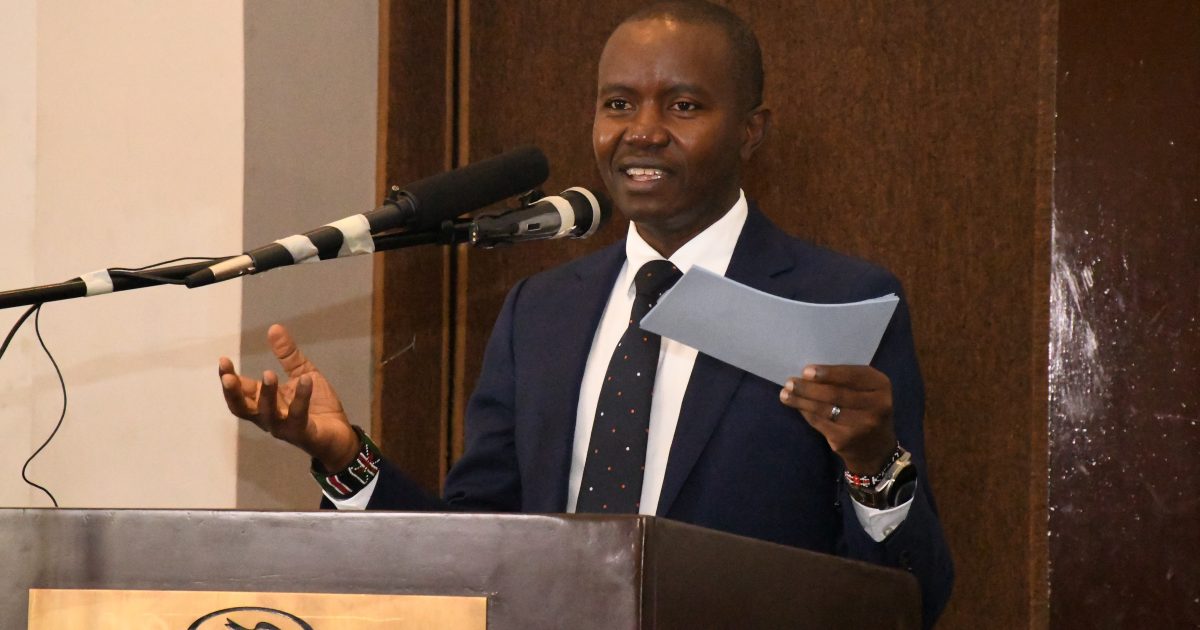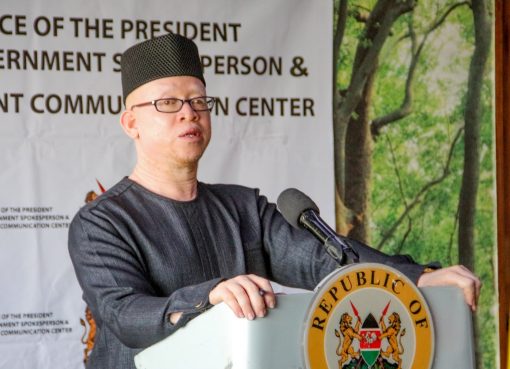The Government has underscored the importance of data protection as a key ingredient in its quest for a digital economy and the attainment of the ‘Big4’ agenda.
Ministry of ICT, Innovation and Youth Affairs Cabinet Secretary (CS), Joe Mucheru, said that while the role of the Government is to provide an enabling policy and legislative environment to grow the economy, it also recognize that there is need for Personal Data Protection to be integrated within the ‘Big Four’ Agenda.
“Under the ‘Big4’ Agenda, the Government plans to create 1.3 million manufacturing jobs and achieve a100 per cent health coverage for every Kenyan by 2022. Additionally, 500,000 affordable houses will be constructed, and technology will be deployed to expand food production and enhance the whole value chain from the farm to produce market,” said Mucheru.
The CS said that the attainment of these ambitious targets requires that everyone plays their respective role, including the Office of Data Protection Commissioner.
Speaking on Wednesday during a stakeholders’ consultation Workshop on the Draft 2022-2025 Strategic Plan for the Office of Data Protection Commissioner, Mucheru said that the Constitution of Kenya guarantees the right to privacy as a fundamental right.
“To give effect to this constitutional right under Article 31(c) and (d), the Data Protection Act, 2019 provides for the regulation of the processing of personal data, including the rights of data subjects and obligations of persons and entities processing personal data,” explained Mucheru.
Mucheru said that his Ministry recognizes the importance of the Office of the Data Protection Commissioner and as a show of the Government’s commitment to this office, the budget allocation was increased from Sh.25 million in Financial Year 2020/2021 to Sh.250 million in the Financial Year 2021/2022, with a proposed allocation of Sh.1.734 billion by the Financial Year 2024/2025 to make the office fully optimal.
“The Kenya Vision 2030 identifies the ICT Sector as a key enabler towards attaining wealth creation, social welfare and international competitiveness. Further, it identifies information technology, as one of the key facilitators to deliver the 10 per cent annual economic growth rate, envisaged under the economic pillar. To achieve this transformation, it is important for the Office of Data Protection Commissioner to be an innovative, independent and accountable personal data regulator,” said Mucheru.
The CS highlighted that the value of output from ICT sector increased by 2.5 per cent to Sh.538.3 billion in 2020, a slower growth compared to the 5.8 per cent registered in 2019.
Mobile cellular telephone and mobile money subscriptions stood at 126.15 and 66.68 in 2020 compared to 111.10 and 60.92 per 100 persons in 2019, respectively.
“Total domestic telephone traffic increased from 58.7 billion minutes in 2019 to 60.3 billion minutes in 2020, whereas the International Telephone Traffic declined, marginally from 1,054.0 million minutes in 2019 to 1,024.4 million minutes in 2020. Total Mobile Money Transfers grew by 20.0 per cent in 2020, one of the largest increments recorded in the last five years to stand at Ksh.5.2 trillion,” said Mucheru.
He added that the value of the mobile commerce transactions grew by 35 per cent to Sh.9.4 trillion in the same period. This increment was driven by preferences to cashless transactions in the wake of Covid-19 and the reduction of mobile money transfer tariffs.
Mucheru said that internet subscribers grew by 7.81 percentage points from 83.38 per cent in 2019 to 91.19 per cent in 2020 while the number of Internet service providers grew from 302 in 2019 to 366 in 2020 driven by demand of internet services during the period under review.
“These statistics demonstrate tremendous growth in our ICT Sector despite the challenges posed by the Covid-19 pandemic and affirms the critical role that the ICT Sector plays in Kenya’s economy,” said Mucheru.
State Department of ICT and Innovation Principal Secretary (PS) Jerome Ochieng called on players in the ICT sector and the wider economy to review the Strategic Plan and give recommendations to help improve the document and make the industry better.
“We will ensure that every other thing that is required within the broader Strategic Plan that needs our facilitation as a Ministry and my facilitation as a Principal Secretary we will be ready and ever to ensure that we are able to deliver,” said Ochieng.
Data Protection Commissioner Immaculate Kassait said that their key success factors is to achieve a digital economy that promotes data protection attracting partnership and establishing collaboration with different networks and leveraging on the digital programmes to entrench data protection.
“Our vision is to enhance trust and build transparency of data protection in Kenya. We expect that we will have an impact on increased confidence for the enhancement of service delivery and attainment of our goals,” said Kassait.
She explained that to facilitate and promote compliance with the Data Protection Laws, her office in collaboration with Kenya School of Government (KSG) are currently developing a Data Protection Curriculum, which will be rolled out in the coming months targeting both the Public and Private Sector on Personal Data Protection.
Nicole Gregory, who was representing the British High Commissioner to Kenya Jane Marriott, said that as the UK Government also have their data strategy which include data protection laws and a strong independent body to uphold data protection laws since data is a driving force for modern economies.
Gregory said that the office of the Data Protection Commissioner can drive the ‘Big4’ agenda by improving public service delivery and support scientific programmes.
By Joseph Ng’ang’a





